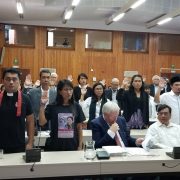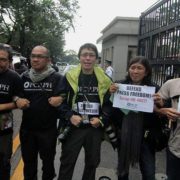South East Asia: Too many journalists targeted for simply doing their job
Journalists directly targeted for attack by public or private individuals is the primary threat for media workers in South East Asia with far too many facing arrest or detainment for simply for doing their jobs. Today, on International Day to End Impunity for Crimes Against Journalists (IDEI), the International Federation of Journalists (IFJ) and the South East Asia Journalists Unions (SEAJU) launch the preliminary findings of the 2019 annual survey of journalist working conditions in the region and call on governments and authorities to do more to enhance the safety of journalists in South East Asia.
The survey, which is the second collaboration of the IFJ and journalist unions in South East Asia, found that the single biggest threat to the safety and security of journalists was their working conditions. The survey delves into the issues impacting journalist safety and working conditions on the region as a whole, as well as taking a focused look at the situation on the ground for media workers in the seven SEAJU member countries including Cambodia, Indonesia, Malaysia, Myanmar, Philippines, Thailand and Timor Leste.
The survey of 1,265 journalists also revealed that one in two journalists had felt insecure in their jobs in the past year. Noted key threats were physical random attacks by members of the general public, threats to journalists’ families or others close to them, and poor working conditions.
The survey also showed that 38% of journalists felt that the media freedom in their countries had worsened or seriously declined in the past 12 months. Impunity for crimes against journalists was seen as a major problem or considered to be at epidemic levels in the region.
Government and political leadership were the two biggest determinants of impunity for crimes against journalists, while the prevailing poor performance of the criminal and civil justice system to deal with such threats and acts of violence against journalists was a major contributing factor. Full results of the survey and an in-depth report will be released later this month on November 23, the anniversary of the Ampatuan Massacre – the single deadliest attack on journalists in history.
Ten years on from the massacre of 58 people including 32 journalists in Maguindanao in the Southern Philippines, there is still no justice for the victims and their families. This year, the Philippines is one of the five countries that IFJ is giving focus to in its global campaign to end impunity.
The National Union of Journalists of the Philippines (NUJP), the IFJ’s Philippines affiliate, has launched a month-long campaign and commemoration of the massacre. #
The chairperson of the NUJP, Nonoy Espina, said: “While a verdict on the Ampatuan massacre would be most welcome, it would not ensure complete justice with many of the suspects remaining at large after a decade, and still hardly make a dent on the dismal record of 186 journalists’ murders in the Philippines since 1986, all but a handful of which have been solved.”
In Indonesia, the chairman of the Alliance of Independent Journalists (AJI) Indonesia, Abdul Manan, said the survey is a brutal reflection of the violence journalists face day today. Ironically, the authorities that should be protecting journalists are the perpetrators of too many assaults.
“We should not stop increasing our efforts to push the government to ensure the safety of journalists. We demand the authorities to bring the perpetrators to justice and end the culture of impunity not only to Indonesian government but also governments in the region, including Philippines,” Manan added.
The IFJ said: “Attacks on journalists are attacks on our freedom. Together with our South East Asia affiliates, today we call the authorities to take urgent action and ensure the freedom and safety of journalists and end all attempts to silence journalists.”







